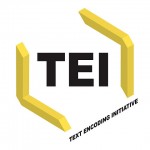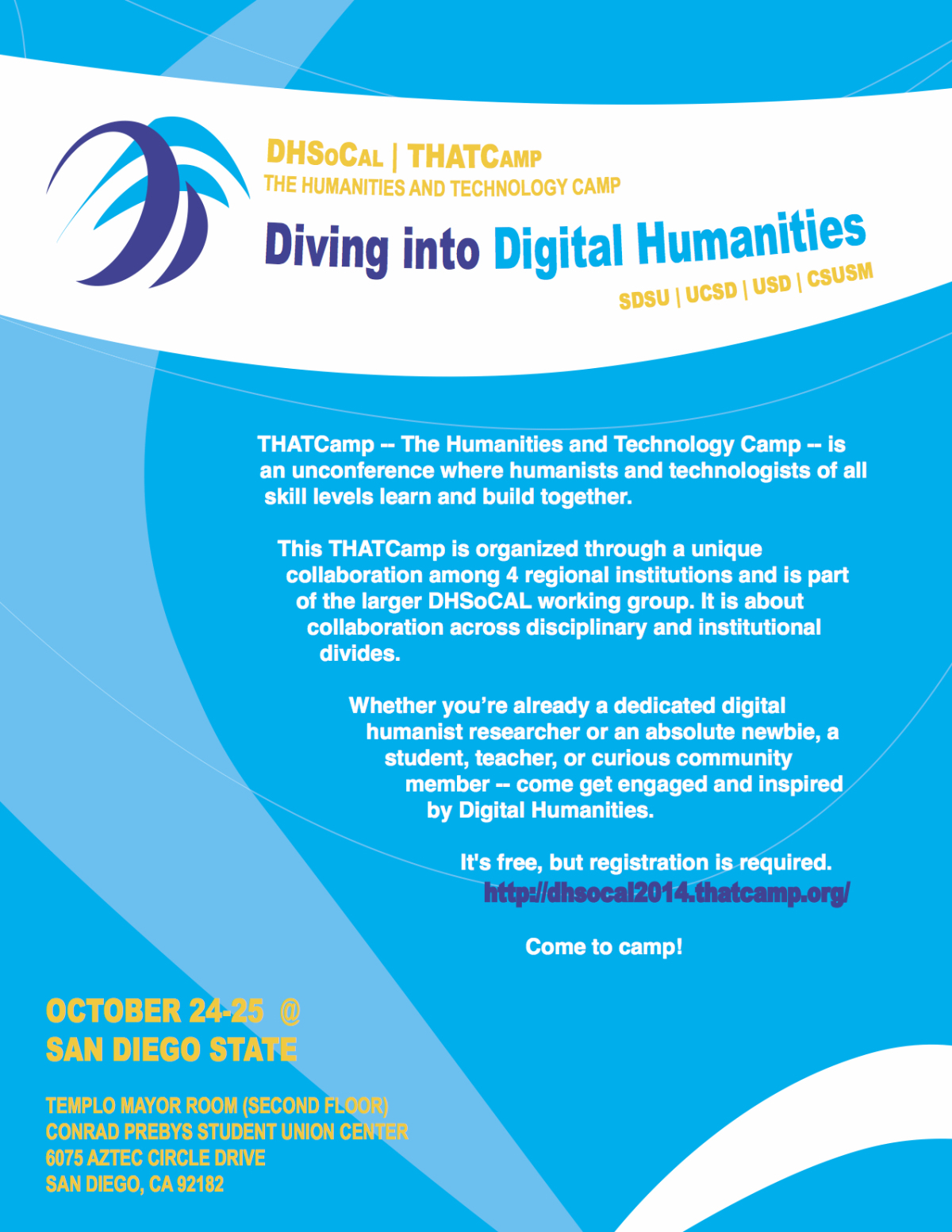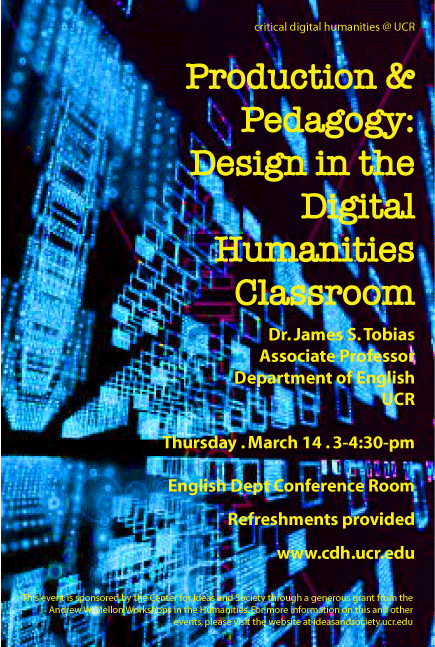Posts from the ‘workshops’ Category
At a few recent meetings we’ve talked about the new digital projects and resources being developed at UC Riverside, as well as other opportunities for graduate students and faculty interested in digital humanities.
Digital Scholars Lab
The UCR Rivera Library will be opening a new Digital Scholars Lab in the coming months. Over the Summer and Fall quarters, I’ve been working for the library as an advisor on digital scholarship projects and digital humanities in general. Once the Lab is open it will be a meeting place for graduate students, researchers, and faculty to start new digital scholarship projects or get help with existing ones. In the meantime if you need assistance with a project or would like more information on digital scholarship and digital humanities, please send me (Steve Anderson) an email: sande010@ucr.edu Although the Lab isn’t officially open at the moment, the Library is still happy to work with scholars and has many resources available. I’ve also made a website as a place to keep my notes for the development of the Lab. The website is a work in progress and it is not the official Lab website, but it does list many resources on digital scholarship and digital humanities: scholarslab.net
Critical Digital Humanities
For the past few years Critical Digital Humanities has been holding discussions on critical theory, reading groups on technoculture and digital media, and hosting invited speakers from a wide array of fields and subjects concerning the digital humanities. These workshops have been made possible by generous funding from the Center for Ideas and Society and Mellon workshop grants. For the 2014-2015 academic year CDH is working on pedagogy and production with Sergei Eisenstein’s unfinished film Que Viva Mexico! as our focus.
DHSocal
In Southern California the digital humanities community stays up to date on recent projects and opportunities through the DHSocal website: http://dhsocal.blogspot.com The calendar is up to date and active, there are lists of resources, and also CFPs and job opportunities. DHSocal is also on Twitter (@dhsocal and #dhsocal), but most of the activity takes place within individual accounts. If you’re just getting started with Twitter and DH, Miriam Posner (@miriamkp) over at UCLA has a very active Twitter feed, and don’t miss her weekly newsletter on DH happenings, tools, and opportunities: http://tinyletter.com/miriamposner
Digital Humanities Summer Programs
If you’re interested in digital humanities, week-long summer workshops are a great way to hone your skills and make new friends. Newcomers to the digital humanities are welcome, and most workshops do not require any technical programming skills or equipment. Over the summer I attended two of these workshops, and they were quite extraordinary experiences. HILT is the Humanities Intensive Learning and Teaching workshop, which was held at the Maryland Institute for Technology in the Humanities, or MITH, at the University of Maryland. This coming summer in 2015, HILT will be held at Indiana University-Purdue University Indianapolis (IUPUI) in Indianapolis, with registration beginning soon. The other workshop I attended was the Digital Humanities Summer Institute, or DHSI, at the University of Victoria in British Columbia. DHSI offers three separate weeks of instruction now and registration is currently open. Both HILT and DHSI have many opportunities to offset the cost of travel and tuition, as well as on-campus housing. DHSI is also offering a Graduate Certificate in Digital Humanities which I hope to finish this year. There are other summer programs in Europe as well, the Joint Culture & Technology and CLARIN-D Summer School in Germany, and the Digital Humanities at Oxford Summer School in England.
This Thursday there’s a Wikipedia Edit-a-thon in the UCR Rivera Library.
October 16th, 10am-4pm, room 403 in the Rivera Library (4th floor)
http://library.ucr.edu/?l=news&article=1092
I’ve always wanted to get more into Wikipedia, and over the last week or so I finally started editing and adding information. Through the digital humanities group DHSoCal I learned about the work of Adrianne Wadewitz, who was a postdoctoral fellow at the Center for Digital Learning and Research at Occidental College. Sadly though, she passed away recently.
This video from Wadewitz’s Wikipedia page is really great for showing why faculty and students should become active Wikipedians:
And if you’re interested in coming, send me an email and we can head over there together: sande010@ucr.edu
THATCamp DHSoCal: Diving into Digital Humanities
October 24th and 25th, 2014
San Diego State University
THATCamp is “The Humanities and Technology Camp,” and it is an “un-conference” meeting where humanists and technologists of all skill levels learn and build together in sessions proposed on the spot.
THATCamp DHSoCal: Diving into Digital Humanities will be held at San Diego State University, but it is organized through a unique digital humanities-style collaboration between 4 regional institutions: San Diego State University (SDSU), University of California at San Diego (UCSD), California State University at San Marcos (CSUSM), and University of San Diego (USD).
Visit http://dhsocal2014.thatcamp.org/ for more information and to register online. It is free and open to the public.
The spirit is inclusive, so, please send this email far and wide—to anyone (colleagues, students, friends) interested in learning about the digital humanities, getting involved in regional collaborations, and geeking out on the intersection between traditional humanities and digital technologies.
Join us to dive into the digital humanities!
More information on the DHSoCal digital humanities group can be found at: http://dhsocal.blogspot.com
 Scalar @ ANVC (Alliance for Networking and Visual Culture at USC):
Scalar @ ANVC (Alliance for Networking and Visual Culture at USC):
http://scalar.usc.edu/learning_scalar/webinar-schedule/
Join us for upcoming webinars.
To follow up on our recent Beta release, the Scalar development team will be offering a series of free online webinars this spring and summer.
Our “Introduction to Scalar” webinars will cover basic features of the platform: a review of existing Scalar books and a hands-on introduction to paths, tags, annotations and importing media. Our “Intermediate Scalar” webinars will delve into more advanced topics including the effective use of visualizations, annotating with media and a primer on customizing appearances in Scalar.
Our summer schedule includes the remaining dates:
Intermediate Scalar: July 31, 4-6pm (PST)
Our fall schedule includes six dates:
Introduction to Scalar: August 21, 10am-12pm (PST)
Intermediate Scalar: September 11, 10am-12pm (PST)
Introduction to Scalar: September 25, 4pm-6pm (PST)
Intermediate Scalar: October 9, 4pm-6pm (PST)
Introduction to Scalar: October 30, 10am-12pm (PST)
Intermediate Scalar: November 20, 10am-12pm (PST)
Spaces are limited, so sign up now!
To register for the online webinars, please visit our registration page.
On February 13th I attended a workshop on TEI and Markup Fundamentals sponsored by the Graduate Quantitative Methods Program. The workshop was given by Rochelle Gold and Kimberly Hall from the Department of English at UC Riverside.
 TEI (Text Encoding Initiative) is a method of encoding texts with markup language for digital representation. TEI markup focuses on rendering the semantic qualities of texts more visible. For example, sentences and clauses can be marked within a text, as well as the lines and features of a poem. This granular level of encoding allows for digital representations of these texts to carry details and information beyond their normal forms, which is valuable for critical interpretation.
TEI (Text Encoding Initiative) is a method of encoding texts with markup language for digital representation. TEI markup focuses on rendering the semantic qualities of texts more visible. For example, sentences and clauses can be marked within a text, as well as the lines and features of a poem. This granular level of encoding allows for digital representations of these texts to carry details and information beyond their normal forms, which is valuable for critical interpretation.
Adding TEI markup to a document is an “intimate” process as described by Hall. With the addition of every XML tag the encoder must make a series of choices based on the priorities of the project. The TEI process can be quite time consuming, but the close reading required for this encoding also fosters a deep understanding of the text itself.
The basic process of TEI encoding consists of three parts:
1. Document Analysis
What is the text, and what are your research and interpretive priorities?
2. Encoding
Adding markup to the digital version of the text. For texts that have not been digitized, this is also a process of transcription into digital form.
3. Output
Our workshop concentrated on the fundamentals of TEI, so we didn’t yet delve into output. However, the first two steps appear to be the primary focus of TEI, as the encoding is more concerned with semantic representation than visual production.
Overall, the workshop was very well done, and it brought to light new possibilities for my own historical teaching and research. Many of the sources I share with students are digitized, and hyperlinks are helpful for connecting to other sources of information. With TEI these linkages can be broadened greatly — for example, I could encode mentions of historical places, uses of foreign language, or references to Classical antiquity and mythology. Integrating TEI into this workflow will be very helpful, allowing students to see primary source texts in new ways, and adding a new dimension to my own research.
Cross-posted at Book, Archive, and Manuscript Studies @ UC Riverside:
http://bam.ucr.edu/2014/02/notes-on-tei-and-markup-fundamentals-workshop/
New CDH Talk : Production & Pedagogy with Professor James S. Tobias
February 25th, 2013
April Durham
Production and Pedagogy: Design in the Digital Humanities Classroom
Dr. James S. Tobias . Associate Professor . Department of English . UC Riverside
Thursday . March 14 . 3-4:30 pm . English Department Conference Room
Refreshments provided.
This event is sponsored by the Center for Ideas and Society through a generous grant from the Andrew W. Mellon Foundation. For more information on this and other events, please visit the website at ideasandsociaty.ucr.edu
Debates in the Digital Humanities is now available online as an open source, and free, project of CUNY:
For those attending the CDH Rhetoric and Remix Reading Group on January 16th, the three articles from Debates in the Digital Humanities are available at the links below:
Lisa Sipro, “This is Why We Fight: Defining the Values of the Digital Humanities”
Alan Liu, “Where is the Cultural Criticism in the Digital Humanities”
I heard about this summer workshop that might interest some of us. It’s at UC Irvine and includes travel, lodging, and food costs for the week.
Values in Design Workshop – August 19-26, 2012
Take part in an intensive one-week workshop on values in the design of information systems and technology. Doctoral students at any stage from a variety of disciplines are invited to attend, including – but not restricted to – informatics, computer science, science studies, design, visual arts, and social entrepreneurship. Travel, food, and lodging will be covered, though accepted participants are encouraged to seek support from their home institutions.
The workshop will be restricted to twenty (20) students. Mornings will be devoted to discussing a judicious mix of readings and exercises from the fields above, led by Geoffrey C. Bowker, Judith Gregory, and Cory Knobel. In the afternoons, students will work in interdisciplinary groups to produce a project plan incorporating strong social values into information systems and technology, with guest lectures from thought leaders such as Paul Dourish, Helen Nissenbaum, and Carl DiSalvo throughout the week. The workshop will close with project presentations to a panel of academics and entrepreneurs. We will offer support and rewards for projects that continue on to working prototypes and project launch.
Dr. Rita Raley, Associate Professor in the English Department of UCSB, and author of Tactical Media (Minnesota, 2009), has confirmed for an April 19 2012 talk.
We’ll post the room and time information as the event approaches.
We had to cancel the November 1 presentation by Alex Juhasz and Natalie Bookchin, but we’ve been able to re-schedule them for January 31 at 4 PM.
The event will be in HMNSS 1500 from 4:00-5:30pm, and refreshments will be served.
We’ll update site information as the event approaches.



